Rakuten Mobile, Inc. and Japan’s New Energy and Industrial Technology Development Organisation (NEDO) has announced completion of a research and development project. This aims at commercial deployment of fully virtualised 5G stand-alone (SA) mobile network radio access network equipment using general-purpose hardware and cloud technology, as part of NEDO’s “Research and Development Project of Enhanced Infrastructures for Post-5G Information and Communication Systems.”
As part of the research and development project, Rakuten Mobile utilised virtualisation technology to deploy 5G SA and radio access network (RAN) slicing, as well as performance improvement and extension of network functionality. Results of the research and development project also confirmed that CAPEX (capital expenditures) and OPEX (operational expenditure) could be reduced by 30% or more compared to conventional mobile networks requiring dedicated hardware and software. These efforts will contribute to acceleration of the deployment of 5G stand-alone mobile networks using general-purpose hardware.
Rakuten Mobile plans to introduce this technology for commercial stand-alone 5G mobile networks in future, and through its subsidiary company Rakuten Symphony, the company aims to further accelerate the global deployment of advanced, fully virtualised 5G stand-alone mobile network platforms developed in Japan.
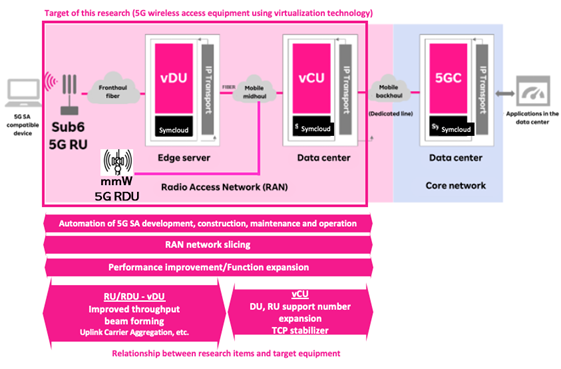
Overview of research and development project
With the development of 5G and a post-5G society, demand for services that utilise features such as ultra-high-speed mobile networks, ultra-low latency and simultaneous multiple connections is expected to steadily increase. To respond to the requirements of a high-quality mobile network it is necessary to develop reliable and cost efficient mobile network equipment which can respond to increases and fluctuations in network traffic.
NEDO aims to build and expand the manufacturing of post-5G information and communication systems in Japan by developing technologies that will form a core part of post-5G networks. To contribute towards this mission, Rakuten Mobile launched a research and development project in July 2020 under the theme of “Research and development into virtualised 5G radio access equipment”.
As part of the research, Rakuten Mobile worked on the development of fully virtualised 5G radio access equipment using general-purpose hardware and cloud technology for stand-alone 5G mobile networks. Furthermore, the company tested the implementation of RAN network slicing and performance improvements achieving ultra-high-speed, ultra-low latency, and simultaneous multiple connections suitable for commercial deployment in large capacity mobile networks.
As a result, Rakuten Mobile was able to confirm that more than three times the number of connected devices could be supported compared to long term evolution (LTE) networks by managing the overheads (increases in processing burden) caused by cloud platforms and software processing.
This result confirmed that CAPEX and OPEX can be reduced by 30% or more compared to conventional mobile networks using dedicated hardware and software, enabling the creation of flexible 5G stand-alone networks.
Results of research and development project
- Development of stand-alone 5G for wireless access equipment – For this research, Rakuten Mobile completed an end-to-end connection test (core-to-core terminal) for 5G stand-alone basic functions using wireless access equipment with virtualisation technology. As a result, the company enabled communication on a fully virtualised 5G stand-alone network from RAN to core network, using 5G stand-alone supported devices and Rakuten Mobile’s 5G stand-alone network. In addition, in order to improve operational efficiency during commercial deployment, Rakuten Mobile developed a platform to automate everything from RAN construction to operations, and maintenance.
- Confirmation of the effectiveness of RAN network slicing – Rakuten Mobile, in collaboration with NEDO’s commissioned project “5G slicing orchestration advancement technology using AI”, has also carried out development of RAN network slicing functionality. This will help to realise 5G stand-alone networks that enjoy ultra-high-speed communication, ultra-low latency, and simultaneous multiple connections.
To test functionality and verify the benefits of RAN network slicing, Rakuten Mobile built a system linking an NEC intrusion detection system (FieldAnalyst for Scene Understanding) equipped with video analysis technology, to RAN network slicing functionality running on the 5G stand-alone network developed in this research project (Fig. 2). The results showed the RAN network slicing function expanded the 5G wireless bandwidth in real-time at the time of intrusion detection, enabling video monitoring to be performed with higher image quality and less latency than at normal times, thereby verifying the effectiveness of the RAN network slicing function (Fig. 3).
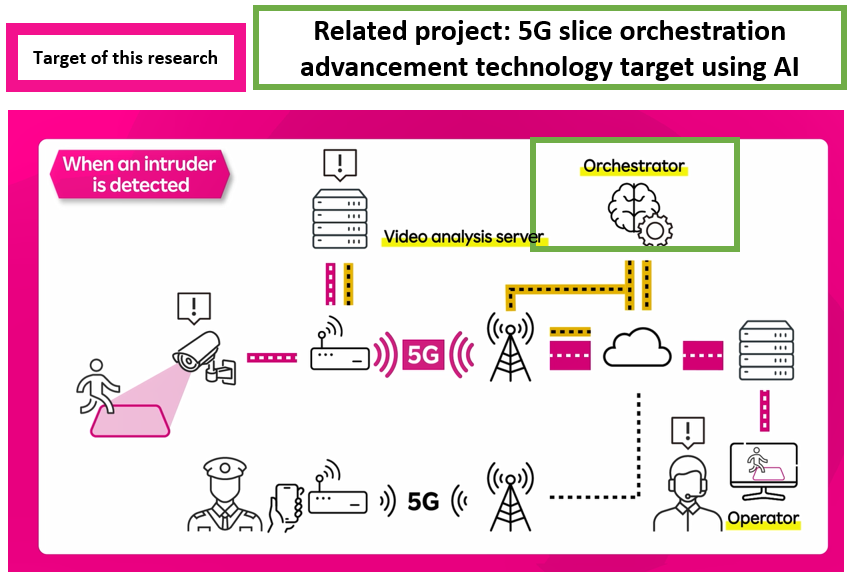
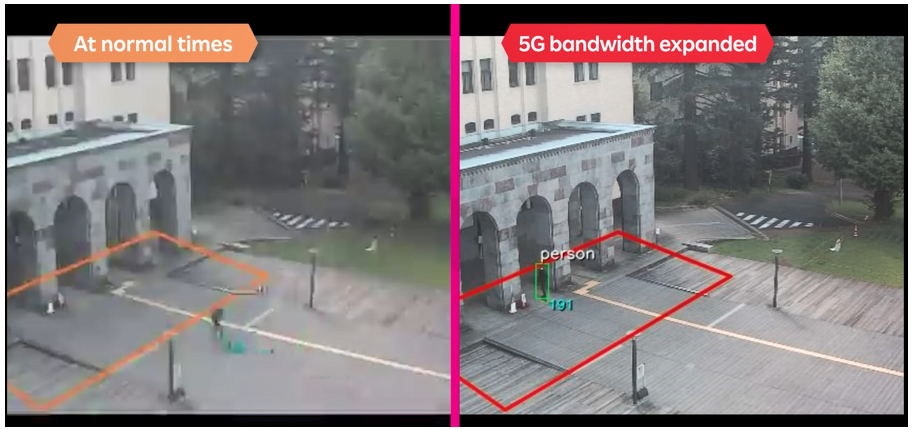
- Performance improvement and extension of functionality towards commercial use – Rakuten Mobile carried out testing and development of various methods for achieving performance improvements and functional enhancements, with the aim of reducing the overhead costs brought about by cloud platforms and software processing that will come with the future introduction of virtualisation technology.
For base station Distributed Unit and Radio Unit support expansion, cloud resources were successfully reduced by expanding the number of cells per virtualised Central Unit (vCU) up to 256 cells, enabling more than three times the number of connected devices compared with LTE networks (Fig. 4). In addition, during Transmission Control Protocol (TCP) stabiliser testing, by arranging the TCP stabiliser at the optimum position in a virtualised environment, Rakuten Mobile verified the stabilisation of end-to-end TCP communication traffic by multiple terminals and improvement in overall throughput (Fig. 5).
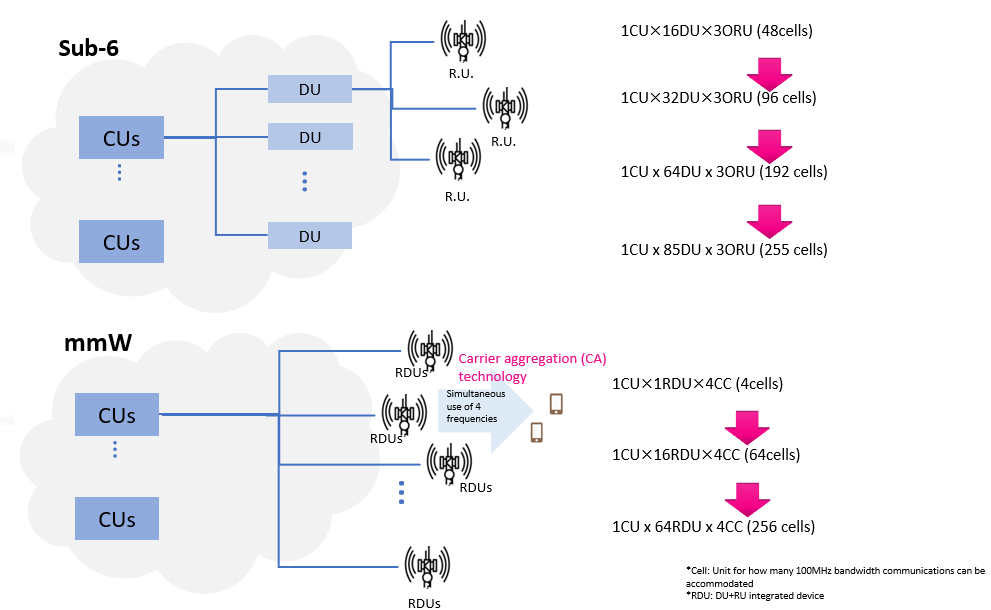
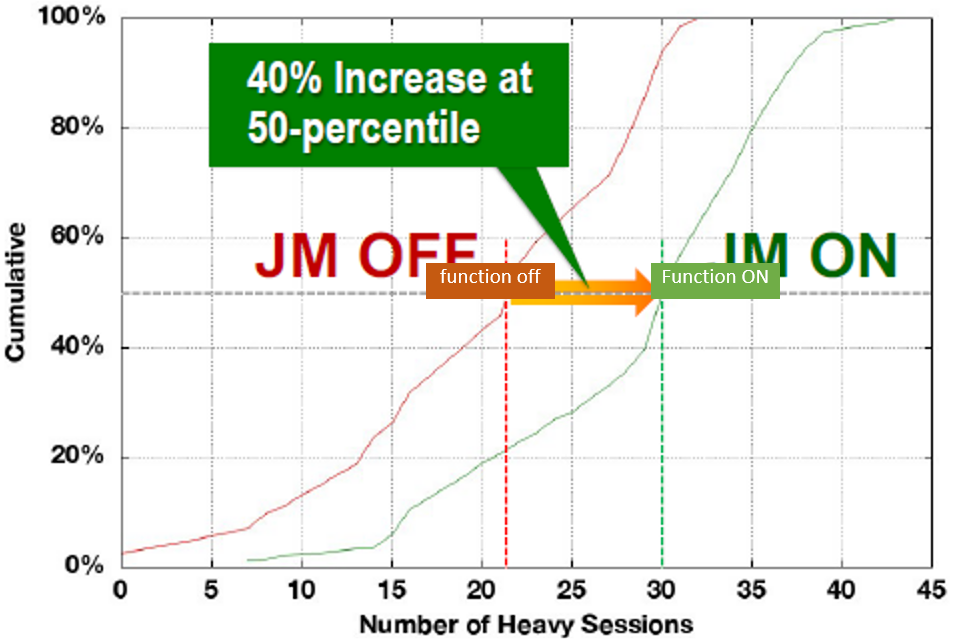
Future plans
The introduction of these research results into commercial 5G stand-alone mobile networks will reduce development and operating costs and enable flexible responses to advanced network quality requirements across various services utilising 5G networks. This is expected to contribute not only to current applications such as voice calling and internet browsing but also to improved convenience in daily life and business.
Rakuten Mobile will continue to promote the development of 5G networks using fully virtualised general-purpose hardware.
NEDO will continue to develop technologies that form the core of post-5G-compatible information and communication systems including stand-alone 5G equipment with the aim of building and expanding the manufacturing base of post-5G information and communication systems in Japan.
Comment on this article below or via Twitter: @VanillaPlus OR @jcvplus






